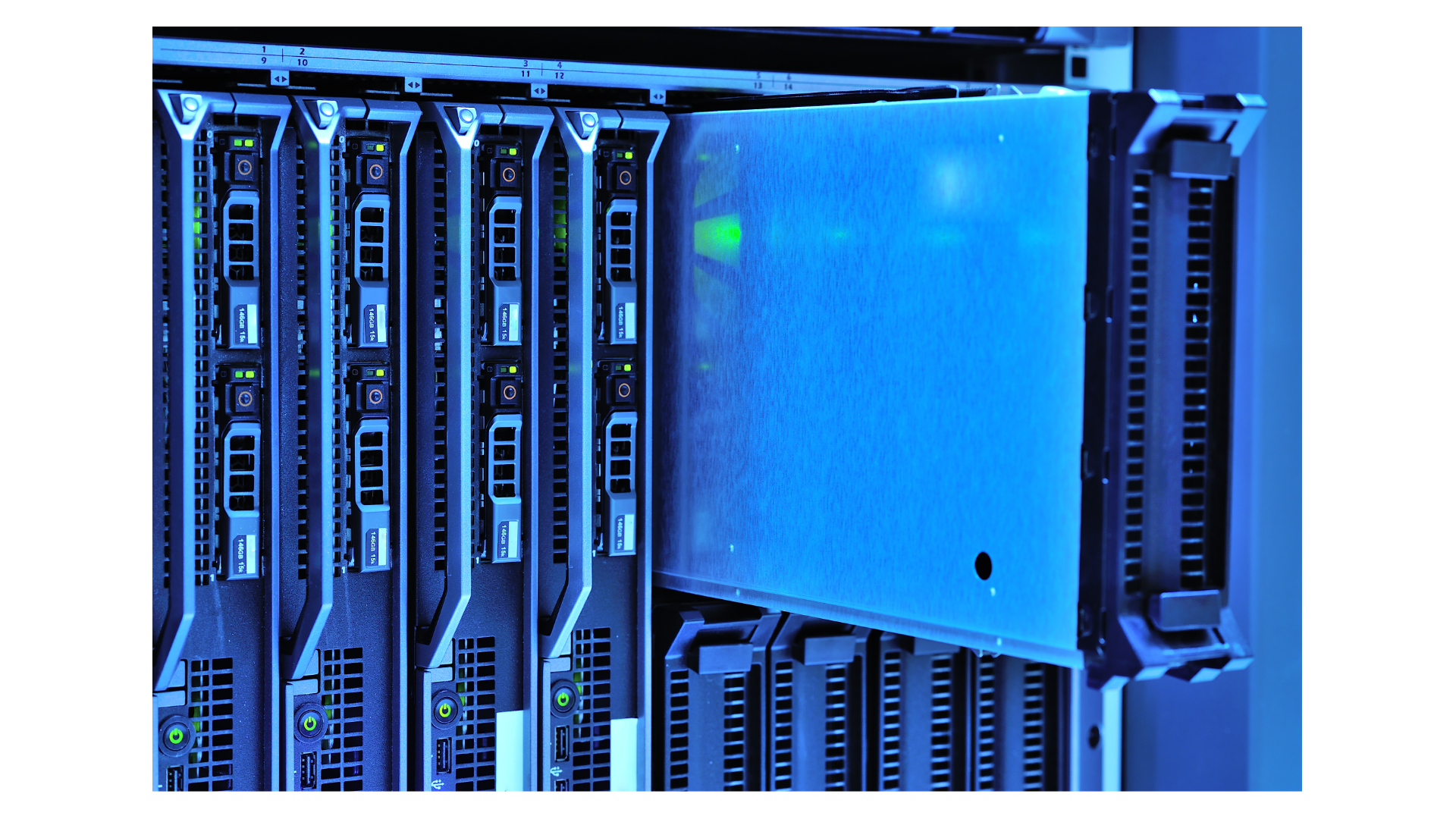De beste opslagserveroplossingen voor uw zakelijke behoeften
Een opslagserver slaat grote hoeveelheden data voor bedrijven op en beheert deze. Het helpt bij het verwerken van grote datasets, waarborgt de gegevensbeveiliging en verbetert de prestaties door de gegevensdoorvoer te versnellen en opslagoplossingen te optimaliseren. Incrementele back-ups worden gebruikt om ruimte te besparen door wijzigingen bij te houden en nieuwe gegevens sinds de laatste back-up toe te voegen, wat de efficiëntie van het gegevensbeheer verbetert. Dit artikel behandelt de beste opslagserveroplossingen en hun functies om aan uw zakelijke behoeften te voldoen.
Inleiding tot opslagservers
Opslagservers zijn gespecialiseerde computers die zijn ontworpen voor het opslaan, beheren en toegankelijk maken van grote hoeveelheden data. Ze bieden een hoge opslagcapaciteit, schaalbaarheid en prestaties, waardoor ze ideaal zijn voor organisaties die betrouwbare en efficiënte dataopslagoplossingen nodig hebben. Deze servers zijn essentieel voor diverse toepassingen, waaronder netwerkgekoppelde opslag (NAS), gegevensopslag en -back-up, zodat bedrijven hun gegevens naadloos kunnen opslaan en ophalen.
Met de toenemende vraag naar dataopslag zijn opslagservers een essentieel onderdeel geworden van de moderne computerinfrastructuur. Ze stellen organisaties in staat om grote hoeveelheden data efficiënt te verwerken en ervoor te zorgen dat informatie direct beschikbaar is wanneer dat nodig is. Of het nu gaat om het opslaan van bedrijfskritische data, het beheren van uitgebreide databases of het bieden van back-upoplossingen, opslagservers spelen een cruciale rol in het ondersteunen van de databehoeften van moderne ondernemingen.
Belangrijkste leerpunten
- Opslagservers met een hoge capaciteit, zoals HPE Apollo en HPE Alletra, zijn essentieel voor het beheer van grote hoeveelheden data en het optimaliseren van de prestaties van data-intensieve toepassingen.
- Geavanceerde functies voor gegevensbeveiliging, waaronder end-to-end-encryptie en anti-DDoS-bescherming, zijn essentieel voor de bescherming van gevoelige informatie en om te zorgen dat aan de wettelijke normen wordt voldaan.
- Dankzij flexibele configuratieopties kunnen bedrijven hun opslagoplossingen personaliseren op basis van specifieke behoeften, vaak met verschillende prijsniveaus. Daarnaast ondersteunen technische ondersteuningsdiensten gebruikers bij de installatie en configuratie, met ondersteuning via documentatie, online helpcenters en directe ondersteuning om uitdagingen het hoofd te bieden en oplossingen op maat te ontwikkelen.
Inhoud
- Inleiding tot opslagservers
- Belangrijkste leerpunten
- Soorten opslagservers
- Opslagservers met hoge capaciteit
- Geavanceerde functies voor gegevensbeveiliging
- Optimalisatie van prestaties voor data-intensieve workloads
- Flexibele configuratie en aanpassing
- Betrouwbare back-up- en hersteloplossingen
- Onderhoud van opslagservers
- Bewaking van opslagservers
- Technische ondersteuning en assistentie
- Kostenefficiëntie en duurzaamheid
- Trends voor opslagservers
- Samenvatting
- Veel Gestelde Vragen
- Wat zijn de voordelen van opslagservers met een hoge capaciteit voor bedrijven?
- Hoe beschermt end-to-end-encryptie gegevens?
- Waarom is anti-DDoS-bescherming belangrijk voor opslagservers?
- Hoe kunnen bedrijven kostenefficiënte opslagoplossingen gebruiken?
- Waarom is technische ondersteuning belangrijk voor opslagservers?
Soorten opslagservers
Er zijn verschillende soorten storageservers beschikbaar, elk met zijn eigen unieke kenmerken en voordelen. Unified storageservers combineren bijvoorbeeld blok- en bestandsopslag in één systeem, wat het beheer vereenvoudigt en de toegankelijkheid verbetert. Deze integratie stelt bedrijven in staat om diverse workloads eenvoudig te verwerken, waardoor unified storage een aantrekkelijke optie is voor veel organisaties.
Softwaregedefinieerde opslag (SDS)-servers gebruiken software om opslagbronnen te beheren en te optimaliseren, wat flexibiliteit en schaalbaarheid biedt. SDS-oplossingen kunnen worden aangepast aan specifieke bedrijfsbehoeften en bieden een kosteneffectieve manier om grote hoeveelheden data te beheren. Windows-server is een andere populaire optie en biedt een reeks opslagoplossingen die naadloos integreren met bestaande Microsoft-omgevingen. Hierdoor is het een veelzijdige keuze voor veel bedrijven.
Schaalbare opslagservers zijn ontworpen om mee te groeien met uw bedrijf, waardoor ze eenvoudig kunnen worden uitgebreid naarmate de opslagbehoefte toeneemt. Deze servers zijn ideaal voor organisaties die een aanzienlijke datagroei verwachten en bieden de capaciteit en prestaties die nodig zijn om aan de vraag te voldoen. Daarnaast zijn er opslagservers die specifiek zijn ontworpen voor kleine bedrijven en die betaalbare en efficiënte oplossingen bieden voor databeheer zonder dat hiervoor uitgebreide IT-middelen nodig zijn.
Opslagservers met hoge capaciteit

Opslagservers met een hoge capaciteit zijn cruciaal voor bedrijven die enorme hoeveelheden data moeten opslaan. Deze systemen kunnen opslagcapaciteiten tot 216 TB aan en bieden daarmee een efficiënte oplossing voor het verwerken van grote datasets. Modellen zoals de HPE Apollo 4000 en HPE Alletra 4000 zijn specifiek ontworpen voor workloads die aanzienlijke opslagruimte vereisen en gericht zijn op databeheer. Dit verhoogt zowel het opslagpotentieel als de operationele productiviteit. Het gebruik van dergelijke robuuste opslagoplossingen voldoet niet alleen aan de behoeften van data-intensieve applicaties zoals kunstmatige intelligentie (AI) en analytics, maar verbetert ook hun vermogen om enorme hoeveelheden data effectief te verwerken.
De aanpasbaarheid van deze systemen op het gebied van schijfaanpassing en schaalbaarheid is een aanzienlijk voordeel voor bedrijven die streven naar prestatieoptimalisatie en die zich in de loop der tijd willen aanpassen. Opslagopties zoals de Storinator leveren indrukwekkende doorvoersnelheden in combinatie met opmerkelijke dichtheidsniveaus en kostenefficiëntie. Dit positioneert ze perfect als geschikte opties voor grootschalige databewaringstaken. De implementatie van deze geavanceerde opslagservers biedt bedrijven ondersteuningsstructuren die speciaal zijn ontworpen voor het efficiënt en betrouwbaar beheren van grote hoeveelheden informatie. Bovendien verbetert de integratie van SSD's in deze systemen hun vermogen om workloads met hoge prestaties en lage latentie te verwerken, waardoor ze nog veelzijdiger en efficiënter worden.
Schaalbare processors en schijfruimtes
Het gebruik van schaalbare processors in combinatie met meerdere schijfposities is essentieel voor het verbeteren van zowel de opslagcapaciteit als de prestaties. Opslagservers kunnen hun schijfruimte optimaliseren tot een indrukwekkende 504 TB, wat een aanzienlijke toename van de opslagcapaciteit mogelijk maakt. De integratie van schaalbare processors en SATA-schijven verbetert de functionaliteit van deze servers door ze de mogelijkheid te bieden om grote hoeveelheden data efficiënt te beheren.
Mogelijkheden zoals hot swapping maken het mogelijk om schijven te vervangen zonder dat het systeem hoeft te worden uitgeschakeld, wat een ononderbroken service bevordert en de downtime vermindert. Deze componenten samen zorgen voor een aanzienlijke verbetering van niet alleen de prestaties, maar ook de schaalbaarheid van verschillende opslagoplossingen.
Geünificeerde opslagoplossingen
Door bestands-, object- en blokopslag in één systeem te integreren, vergemakkelijken unified storage-oplossingen het beheer en vergroten ze de toegankelijkheid voor diverse applicaties en workloads. Deze samensmelting kan de operationele efficiëntie verbeteren en de infrastructuuruitgaven verlagen, wat het een aantrekkelijke optie maakt voor bedrijven die hun storagebeheer willen consolideren.
Netwerkopslag (NAS)
NAS-systemen, ontworpen om het delen van bestanden via netwerken te stroomlijnen, vormen een essentieel onderdeel van de opslaginfrastructuur binnen een bedrijf. Deze systemen beschikken niet alleen over een aanzienlijke opslagcapaciteit, maar verbeteren ook het gemak waarmee gegevens toegankelijk zijn en beheerd kunnen worden door directe toegang te bieden voor efficiënt gegevensbeheer.
NAS is geschikt voor zowel kleine startups als expansieve ondernemingen en biedt een betrouwbare en uitbreidbare optie, speciaal ontworpen voor de opslag van gegevens op een netwerk.
Geavanceerde functies voor gegevensbeveiliging

In een tijd waarin het risico op cyberincidenten en datalekken hoog is, is het essentieel dat opslagoplossingen zijn uitgerust met geavanceerde beveiligingsfuncties. Deze maatregelen zijn cruciaal voor de bescherming tegen ongeautoriseerde toegang tot en wijzigingen in opgeslagen gegevens. HPE Alletra Storage-servers maken bijvoorbeeld gebruik van Zero Trust-beveiliging Frameworks als onderdeel van hun verdedigingsstrategie. Naleving van wettelijke normen zoals de AVG en HIPAA is cruciaal bij de omgang met persoonlijke of vertrouwelijke informatie. Naleving vereist het hanteren van specifieke procedures voor het verwerken en opslaan van dergelijke gevoelige gegevens.
Het niet naleven van deze regelgeving met betrekking tot gegevensbescherming kan ernstige juridische gevolgen hebben en de integriteit van iemands digitale verdediging in gevaar brengen. Daarom moeten organisaties topprioriteit geven aan veilige opslagoplossingen die niet alleen de veiligheid van hun assets garanderen, maar hen ook helpen te voldoen aan de noodzakelijke wettelijke richtlijnen.
De gegevensbeveiliging wordt verbeterd door gebruik te maken van end-to-end-encryptie, anti-DDoS-mechanismen en veilige replicatiesoftware. Deze methoden bieden een extra beschermingslaag voor informatie die op servers is opgeslagen.
End-to-end-encryptie
Vanaf het moment dat het wordt gecreëerd totdat het het beoogde eindpunt bereikt, end-to-end-encryptie beveiligt gegevens om de vertrouwelijkheid ervan te behouden en ervoor te zorgen dat alleen geautoriseerde personen er toegang toe hebben. Door de privacy van gegevens gedurende de gehele levenscyclus te waarborgen – inclusief de aanmaak en de daaropvolgende toegankelijkheid – fungeert dit type encryptie als een beschermende barrière tegen ongeautoriseerde toegang en blijft de integriteit van de informatie behouden.
Anti-DDoS-bescherming
Om opslagservers te beschermen tegen grootschalige cyberaanvallen die de service kunnen onderbreken, moet u anti-DDoS Verdediging is cruciaal. Deze maatregelen behouden de beschikbaarheid van de service door de overweldigende hoeveelheid verkeer veroorzaakt door cyberdreigingen te beperken, waardoor de operationele veiligheid van opslagoplossingen behouden blijft.
Veilige replicatiesoftware
Veilige replicatiesoftware speelt een cruciale rol bij het garanderen van dataredundantie, waardoor bedrijven ook bij storingen toegang tot hun informatie kunnen blijven houden. Door verschillende datasites te koppelen, biedt de software direct updates en minimaliseert de kans op dataverlies. Om de beveiliging te verhogen, beschermt end-to-end encryptie de gerepliceerde informatie tijdens de overdracht.
Bescherming tegen DDoS-aanvallen zorgt ervoor dat de replicatieservices continu en zonder onderbrekingen blijven functioneren, waardoor de integriteit van de gegevens behouden blijft.
Optimalisatie van prestaties voor data-intensieve workloads

Het verbeteren van de prestaties van opslagservers is essentieel voor het effectief verwerken van grote hoeveelheden data-intensieve workloads. Deze servers kunnen de gegevensverwerking voor AI/ML-workloads en andere datagestuurde initiatieven versnellen, waardoor de snelheid en efficiëntie aanzienlijk worden verbeterd. Door gebruik te maken van geavanceerde architectuur en geavanceerde technologieën kan de efficiëntie van deze servers aanzienlijk worden verhoogd, waardoor ze ideaal zijn voor gebruik in veeleisende scenario's zoals kunstmatige intelligentie/machine learning (AI/ML) en analyseprocessen die een hoge doorvoer vereisen. Efficiënte back-upprocessen spelen ook een cruciale rol, omdat ze wijzigingen bijhouden en nieuwe gegevens sinds de laatste back-up opnemen, waardoor opslagruimte en prestaties worden geoptimaliseerd.
De HPE Alletra Storage Server 4210 is bijvoorbeeld geschikt voor workloads die draaien om veeleisende dataopslag, terwijl zijn tegenhanger, de HPE Alletra 4140, specifiek is afgestemd op taken waarbij grote hoeveelheden data moeten worden beheerd, zoals archivering of het opzetten van uitgebreide datalakes. Deze verfijnde opslagopties stellen organisaties in staat om zware eisen aan hun dataverwerkingscapaciteiten effectiever te beheren.
Servers zoals de HPE Alletra 4000-serie zijn speciaal ontworpen om de snelheid waarmee ze grote hoeveelheden informatie verwerken te verbeteren – eigenschappen die met name gunstig zijn voor AI/ML-gerelateerde functies. Door deze geavanceerde opslagoplossingen te implementeren, kunnen bedrijven niet alleen hogere prestatieniveaus bereiken, maar ook de uitbreidingsmogelijkheden die gelijke tred houden met de groeiende behoeften van applicaties die sterk afhankelijk zijn van grote hoeveelheden en snelle databewegingen.
Hoge doorvoer en lage latentie
Het is van cruciaal belang om de snelle verwerking van applicaties die sterk afhankelijk zijn van data te garanderen. Hiervoor zijn systemen nodig die grote hoeveelheden data met hoge snelheid en minimale vertraging kunnen leveren. Het beheer van workloads met veel data vereist dergelijke krachtige mogelijkheden om effectief te zijn. SSD's die gebruikmaken van NVMe-technologie kunnen een aanzienlijke toename in IOPS bieden vergeleken met conventionele HDD's, wat leidt tot verbeteringen in het gehele prestatiespectrum van het systeem.
Door de toegang tot data te versnellen, verbeteren deze kenmerken zowel de gebruikerstevredenheid als de efficiëntie van de bedrijfsvoering aanzienlijk. Hoge doorvoersnelheid en lage latentie zijn essentiële factoren voor efficiënte applicatiefunctionaliteit in deze contexten.
SSD's en hybride opslagopties
Het gebruik van een combinatie van SSD's en conventionele HDD's kan de snelheid waarmee gegevens worden geraadpleegd, evenals de prestaties van het gehele systeem, aanzienlijk verbeteren. Door SSD's te gebruiken vanwege hun hoge snelheden en HDD's vanwege hun grotere opslagcapaciteit, maken hybride configuraties effectief beheer en ophalen van gegevens mogelijk.
Een dergelijke combinatie, die zowel de snelheid als de opslagruimte optimaliseert, maakt hybride opstellingen een aantrekkelijke keuze voor bedrijven die hun opslagoplossingen willen verbeteren.
Schaalbare Intel Xeon-processors
Schaalbare processors van Intel Xeon bieden een aanzienlijke hoeveelheid rekenkracht, perfect geschikt voor toepassingen die robuuste verwerkingscapaciteit vereisen. Ze zijn ontworpen om workloads die een hoge mate van gelijktijdigheid vereisen, moeiteloos te beheren en bieden krachtige prestaties voor toepassingen op bedrijfsniveau.
Intel heeft de schaalbare Xeon-processors uitgerust met geïntegreerde accelerators die hun prestaties bij een breed scala aan veeleisende taken verbeteren. Deze ontwikkeling ondersteunt de schaalbaarheid en maakt efficiënter databeheer mogelijk.
Flexibele configuratie en aanpassing

Bedrijven hebben behoefte aan opslagoplossingen die kunnen worden geconfigureerd en verfijnd om gelijke tred te houden met hun veranderende behoeften. Door schaalbare cloudopslag te implementeren, kunnen organisaties hun resources opschalen in lijn met hun groei, waardoor de noodzaak voor aanzienlijke investeringen in fysieke hardware-infrastructuur afneemt. Het vermogen om schaalbaarheid te plannen is essentieel, omdat het bedrijven de mogelijkheid biedt om zowel de capaciteit als de prestaties stapsgewijs te verbeteren in reactie op de verwachte datagroei, terwijl de kosten effectief worden beheerd. Deze mate van aanpasbaarheid speelt een sleutelrol bij het behoud van operationele efficiëntie en het voldoen aan toenemende opslagbehoeften nadat de service is geleverd.
De beschikbaarheid van opslagservers die geschikt zijn voor verschillende besturingssystemen en applicaties biedt bedrijven de veelzijdigheid die nodig is om hun opslagconfiguraties aan te passen aan specifieke eisen. Deze configuraties variëren van volledig ondersteunde systemen, compleet met softwareondersteuning, tot bare-metal-configuraties die alleen de benodigde hardwarecomponenten bieden. Zo beschikken bedrijven over de benodigde ruimte om hun serverinfrastructuur aan te passen, inclusief opties die geoptimaliseerd zijn voor de server.
Besturingssystemen en softwaregedefinieerde opslag
Veel opslagsystemen zijn standaard uitgerust met veelgebruikte besturingssystemen zoals Windows en Linux. De Proxinator bijvoorbeeld bevat Linux al voorgeïnstalleerd, waardoor bedrijven opslagoplossingen krijgen die direct kunnen worden geïntegreerd in hun huidige IT-omgeving.
Stimuleer maatwerk en uitbreiding
Bedrijven hebben het voordeel dat ze kunnen kiezen uit een breed scala aan schijftypen en -groottes, waardoor ze: hun opslagoplossingen aanpassen aan specifieke prestatie- en capaciteitsvereistenDankzij deze aanpasbaarheid bij het configureren van hun opslaginfrastructuur kunnen organisaties in de loop van de tijd meegroeien met veranderende behoeften.
Integratie met bestaande infrastructuur
Specialisten in dataopslag kunnen helpen bij het integreren van opslagoplossingen in de bestaande IT-netwerkinfrastructuur van een organisatie met minimale verstoring door gebruik te maken van tools zoals private virtual networks (vRack). Dit zorgt voor een soepel integratieproces en zorgt ervoor dat de overgang geen significante verstoringen veroorzaakt.
Om veilige overdrachten via het vRack mogelijk te maken, is het belangrijk om het openbare IP-adres op de dedicated server te deactiveren. Deze integratie stelt bedrijven in staat hun storage-infrastructuur te upgraden zonder hun huidige systemen volledig te hoeven vervangen.
Betrouwbare back-up- en hersteloplossingen

Moderne ondernemingen moeten betrouwbare back-up- en herstelstrategieën gebruiken om de integriteit en toegankelijkheid van hun gegevens te behouden. Moderne opslagservers zijn uitgerust met geavanceerde back-uptechnologieën die de gegevensintegriteit waarborgen en tegelijkertijd snelle herstelprocessen mogelijk maken. Door gebruik te maken van veilige replicatiesoftware zorgen deze systemen voor verbeterde redundantie door het creëren van exacte duplicaten op verschillende locaties, wat een solide basis vormt voor effectieve noodherstelplannen. Dergelijke praktijken zorgen voor consistente beschikbaarheid van gegevens en bieden bedrijven bescherming tegen mogelijke verliezen.
Om hun informatiebronnen te beschermen en de bedrijfsvoering na verstoringen snel te kunnen hervatten, zijn organisaties afhankelijk van robuuste back-up- en hersteloplossingen. Deze zorgen voor een efficiënte gegevensopslag, een aanzienlijke vermindering van downtime en het behoud van de lopende bedrijfsactiviteiten. De implementatie van incrementele en differentiële back-ups vormt een aanvulling op de naleving van compliance-eisen en wettelijke normen, waardoor de betrouwbaarheid van deze beschermingsmaatregelen wordt versterkt.
Incrementele en differentiële back-ups
Incrementele back-ups beginnen met een volledige back-up en slaan alleen de wijzigingen op die na de meest recente back-up zijn aangebracht, waardoor de opslagruimte effectief wordt benut. Differentiële back-ups daarentegen verzamelen alle wijzigingen sinds de vorige volledige back-up, waardoor in feite elke wijziging na de initiële back-up wordt vastgelegd.
Differentiële back-ups verbruiken weliswaar meer opslagcapaciteit dan vergelijkbare back-ups, maar ze bieden een sneller proces voor gegevensherstel dan incrementele back-ups.
Strategieën voor gegevensback-up
Het opstellen van een duidelijke strategie voor databack-up is cruciaal om de kans op verlies van waardevolle informatie te verkleinen. Om te garanderen dat dataherstel succesvol zal zijn wanneer nodig, is het belangrijk om regelmatig te controleren of back-upsystemen correct functioneren. Dit helpt operationele onderbrekingen te beperken en beschermt tegen mogelijk dataverlies.
De 3-2-1-methode voor het maken van back-ups van gegevens wordt erkend als een effectieve aanpak om bescherming te bieden tegen lokale calamiteiten. Deze tactiek pleit ervoor om drie afzonderlijke kopieën van uw gegevens op twee verschillende media te bewaren, waarbij één kopie op een andere locatie wordt bewaard dan de andere.
Naleving en wettelijke normen
Het naleven van compliance- en regelgevingsnormen is essentieel voor de bescherming van gegevens en het voorkomen van datalekken. Procedures zoals schijfopschoning, waarbij de Destroyinator tot 60 schijven tegelijk kan wissen, spelen een cruciale rol bij het voldoen aan de nalevingsvereisten van de sector en garanderen dat informatie niet kan worden hersteld van gedeactiveerde schijven.
Door deze protocollen te volgen, wordt de blootstelling aan risico's verminderd en wordt het vertrouwen onder klanten versterkt.
Onderhoud van opslagservers
Regelmatig onderhoud is cruciaal om optimale prestaties en betrouwbaarheid van opslagservers te garanderen. Dit omvat taken zoals het bewaken van de schijfruimte, het updaten van software en firmware en het regelmatig uitvoeren van back-ups. Het is ook essentieel om ervoor te zorgen dat opslagservers correct geconfigureerd en geoptimaliseerd zijn voor de specifieke behoeften van de organisatie. Dit kan het installeren van veilige replicatiesoftware, het configureren van schijfstations voor maximale efficiëntie en het optimaliseren van de verwerkingskracht omvatten om data-intensieve workloads te verwerken.
Door regelmatig onderhoud uit te voeren, kunnen organisaties dataverlies voorkomen, de bedrijfscontinuïteit waarborgen en de algehele systeemprestaties verbeteren. Proactief onderhoud verlengt niet alleen de levensduur van opslagservers, maar verbetert ook hun betrouwbaarheid, waardoor kritieke gegevens altijd toegankelijk zijn wanneer dat nodig is.
Bewaking van opslagservers
Het monitoren van opslagservers is cruciaal om ervoor te zorgen dat ze optimaal functioneren. Dit omvat: het bijhouden van belangrijke prestatie-indicatoren zoals doorvoer, latentie en schijfgebruikDoor deze statistieken nauwlettend in de gaten te houden, kunnen organisaties snel problemen identificeren en oplossen, gegevensverlies voorkomen en ervoor zorgen dat hun opslaginfrastructuur soepel functioneert.
Gespecialiseerde monitoringtools en -software kunnen realtime inzicht bieden in de prestaties van opslagservers, waardoor het beheer en de optimalisatie van opslagbronnen eenvoudiger wordt. Veel moderne opslagservers beschikken over ingebouwde monitoringmogelijkheden die een compleet beeld geven van de systeemstatus en -prestaties. Effectieve monitoring helpt organisaties om hoge prestatie- en betrouwbaarheidsniveaus te behouden en ervoor te zorgen dat consistent aan hun dataopslagbehoeften wordt voldaan.
Technische ondersteuning en assistentie
Om de soepele werking en levensduur van opslagservers te garanderen, is robuuste technische ondersteuning nodig om gebruikers te helpen bij de installatie en configuratie. Bedrijven zoals 45Drives bieden hulp bij de configuratie op afstand en bieden diverse configuraties die voldoen aan uiteenlopende zakelijke vereisten, waaronder hands-off, over-the-shoulder en air-gapped configuraties. De toewijding van hun supportmedewerkers in de samenwerking met IT-experts, partners en leveranciers garandeert een efficiënte oplossing voor alle problemen met betrekking tot opslag. Technische ondersteuning is essentieel voor het optimaliseren van prestatie-afstemmingstaken, het efficiënt uitbreiden van opslagcapaciteiten, het effectief strategisch beheren van back-ups en het nauwgezet beheren van toegangscontrole – allemaal cruciale componenten voor een soepele werking van opslagsystemen.
Bedrijven kunnen hun opslagoplossingen vakkundig beheren, wetende dat ze kunnen rekenen op sterke technische ondersteuning. Dit geeft de zekerheid dat deskundige hulp altijd paraat staat wanneer nodig. De ondersteuning door 24-uurs nooddiensten, aangevuld met op maat gemaakte installatiebegeleiding op afstand en gespecialiseerde trainingen, versterkt de ondersteuning die bedrijven die voor hun bedrijfsvoering afhankelijk zijn van deze systemen aanzienlijk.
24/7 nooddienst
Proxinator biedt een uitgebreide service die continue ondersteuning biedt om de integriteit van cruciale infrastructuur te behouden en zo een snelle oplossing van eventuele problemen te garanderen. Deze end-to-end service zorgt ervoor dat bedrijven altijd toegang hebben tot ondersteuning wanneer dat nodig is.
Voor de operationele continuïteit en veiligheid van opslagsystemen is het van essentieel belang dat hulpdiensten 24 uur per dag en zeven dagen per week bereikbaar zijn. Daarmee wordt hun cruciale rol bij het in stand houden van de vitale infrastructuur onderstreept.
Hulp bij installatie en configuratie op afstand
Technische ondersteuning biedt deskundige begeleiding om een soepele installatie en configuratie op afstand te vergemakkelijken en bedrijven te voorzien van de nodige kennis voor het uitvoeren van complexe implementatietaken. Het aanbieden van gerichte trainingsinitiatieven en tools verbetert de vaardigheid van medewerkers in het effectief bedienen en instellen van storageservers.
Er zijn 24 uur per dag nooddiensten beschikbaar, waardoor bedrijven bij dringende problemen tijdens het proces van het op afstand opzetten van hun opslagservers snel ondersteuning kunnen krijgen. Zo worden mogelijke onderbrekingen in de service tot een minimum beperkt.
Training en middelen
Het aanbieden van gespecialiseerd educatief materiaal, zoals webinars, versterkt de vaardigheden die nodig zijn voor efficiënt dataopslagbeheer. Continue educatie zorgt ervoor dat professionals op de hoogte blijven van nieuwe technologieën en optimale methoden voor opslagbeheer. Middelen zoals workshops en certificeringscursussen bevorderen de voortdurende ontwikkeling van vaardigheden in opslagbeheer en garanderen dat organisaties zijn toegerust om hun dataopslagbehoeften effectief te beheren.
Kostenefficiëntie en duurzaamheid
Efficiëntie in zowel kosten als duurzaamheid is van cruciaal belang voor bedrijven bij het selecteren van opslagoplossingen. Kant-en-klare opslagsystemen die vooraf geconfigureerd zijn, kunnen snel worden geïmplementeerd, wat zorgt voor directe bruikbaarheid en minimale installatietijd. Het gebruik van een gelaagde back-upbenadering die zowel lokale als cloudgebaseerde opties benut, kan de beveiliging van gegevens aanzienlijk verbeteren en biedt niet alleen flexibiliteit, maar ook snellere herstelmogelijkheden. Het bewaren van meerdere kopieën van gegevens op verschillende locaties – ook wel dataredundantie genoemd – fungeert als bescherming tegen volledig verlies door één enkel storingspunt. Voordelige opslagalternatieven zijn cruciaal voor effectief gegevensbeheer en voorkomen tegelijkertijd aanzienlijke financiële uitgaven, waardoor een meer strategische distributie van bedrijfsbronnen mogelijk wordt.
Investeren in state-of-the-art hardware die energieverbruik optimaliseert, kan leiden tot aanzienlijke besparingen op energiekosten en tegelijkertijd de ecologische voetafdruk van de bedrijfsvoering verkleinen. Door gebruik te maken van dergelijke efficiënte apparatuur kunnen bedrijven de operationele kosten verlagen en tegelijkertijd een positieve bijdrage leveren aan het milieu.
Door schaalbare processors te combineren met een reeks schijfstations, wordt de capaciteit vergroot en worden de prestaties met betrekking tot opslagbehoeften verbeterd. Deze configuratie bereidt bedrijven voor op probleemloze uitbreiding zonder grote extra uitgaven.
Prijs- en bezorgopties
De kosten voor opslagservers omvatten doorgaans opties zoals abonnementen met maandelijkse facturering, prijsmodellen op basis van gebruik of directe aankoop van de serverhardware. Er zijn verschillende configuraties van opslagservers beschikbaar met een scala aan prijsstrategieën die aansluiten op uiteenlopende zakelijke behoeften – waaronder pay-as-you-go-abonnementen, terugkerende abonnementskosten of eenmalige hardware-investeringen.
Dankzij deze verschillende betaalmethoden kunnen bedrijven een opslagserver kiezen die past bij hun financiële beperkingen en voorkeuren. Zo hebben ze meer flexibiliteit bij het beheren van budgettaire overwegingen.
Energiezuinige hardware
Kiezen voor opslagoplossingen met energiezuinige componenten kan leiden tot een aanzienlijke verlaging van zowel de energiekosten als de milieu-impact. Een moderne, efficiënte opslagoplossing kan het energieverbruik verlagen, wat vervolgens de totale operationele kosten gedurende de levensduur verlaagt.
Voor bedrijven die hun bedrijfskosten willen verlagen en hun ecologische voetafdruk willen minimaliseren, is het gebruik van energiezuinige hardware essentieel. Deze focus ondersteunt duurzaamheid en stimuleert innovatie binnen het bedrijfsleven.
Schaalbaarheid op lange termijn
Verbetering van de opslagcapaciteit en -prestaties wordt mogelijk gemaakt door de integratie van schaalbare processors en een groot aantal schijfposities, waardoor de verwachte groei gemakkelijker kan worden opgevangen. De mogelijkheid om schijftypen en hun capaciteit aan te passen, stelt bedrijven in staat hun opslagoplossingen af te stemmen op veranderende behoeften.
Doordat nieuwe opslagoplossingen eenvoudig in bestaande IT-systemen kunnen worden geïntegreerd, wordt een efficiënte integratie binnen de bestaande infrastructuur gewaarborgd. Zo wordt blijvende schaalbaarheid, duurzaamheid en naadloze invoering bevorderd.
Trends voor opslagservers
De markt voor opslagservers is voortdurend in ontwikkeling, met voortdurend nieuwe technologieën en innovaties. Een van de huidige trends is het gebruik van schaalbare Intel Xeon-processors, die hoge prestaties en lage latentie bieden, waardoor ze ideaal zijn voor data-intensieve toepassingen. Ook de acceptatie van SSD's neemt toe, wat snelle en efficiënte opslagoplossingen biedt die de algehele systeemprestaties verbeteren.
Cloudgebaseerde opslagoplossingen worden steeds populairder en bieden schaalbaarheid, flexibiliteit en kostenbesparingen. Deze oplossingen stellen bedrijven in staat hun opslagcapaciteit naar behoefte te schalen, zonder dat ze daarvoor aanzienlijke investeringen in hardware hoeven te doen. Daarnaast wint het gebruik van kunstmatige intelligentie (AI) en machine learning (ML) om opslagbronnen te optimaliseren aan populariteit, waardoor organisaties hun gegevens effectiever kunnen beheren.
Duurzaamheid en energie-efficiëntie worden ook steeds belangrijkere overwegingen bij het ontwerp van opslagservers. Bedrijven zoeken naar manieren om hun impact op het milieu te verminderen en de operationele kosten te verlagen, waardoor energiezuinige hardware een belangrijke focus is. Naarmate data steeds belangrijker wordt, zullen opslagservers een steeds crucialere rol spelen bij het ondersteunen van de bedrijfsvoering en het leveren van innovatieve diensten.
Samenvatting
Kortom, het belang van het kiezen van geschikte opslagserveroplossingen voor moderne zakelijke vereisten kan niet genoeg worden benadrukt. Bedrijven moeten beschikken over servers met een aanzienlijke capaciteit, geavanceerde gegevensbeschermingsmechanismen en een nauwkeurige afstemming om data-intensieve workloads efficiënt af te handelen. De mogelijkheid om configuraties aan te passen en flexibele aanpassingsopties te bieden, is essentieel voor het effectief beheren en beschermen van bedrijfsgegevens. Betrouwbare back-upmogelijkheden in combinatie met uitgebreide technische ondersteuning dragen positief bij aan de versterking van het algehele opslagsysteem.
Economische efficiëntie en milieuvriendelijkheid mogen niet over het hoofd worden gezien: hardware die is ontworpen voor energiebesparing en schaalbare opslagopties bieden blijvende voordelen. Door deze elementen grondig te beoordelen, kunnen bedrijven weloverwogen keuzes maken die hun expansie en operationele productiviteit versterken. Het benutten van de mogelijkheden van geavanceerde opslagoplossingen is essentieel om uw bedrijf vooruit te helpen en een concurrentievoordeel te behouden in ons huidige tijdperk, dat wordt gedomineerd door dataafhankelijkheid.
Veel Gestelde Vragen
Wat zijn de voordelen van opslagservers met een hoge capaciteit voor bedrijven?
Opslagservers met een hoge capaciteit verbeteren de operationele efficiëntie door grote hoeveelheden gegevens te beheren en gegevensgerichte workloads te ondersteunen. Hierdoor zijn ze essentieel voor bedrijven met een hoge opslagbehoefte.
Deze mogelijkheid kan leiden tot betere prestaties en gestroomlijnde bedrijfsvoering.
Hoe beschermt end-to-end-encryptie gegevens?
Met end-to-end-encryptie worden uw gegevens beschermd door ervoor te zorgen dat alleen geautoriseerde gebruikers er toegang toe hebben. De vertrouwelijkheid blijft gewaarborgd vanaf het moment dat de gegevens worden verzonden totdat ze de beoogde ontvanger bereiken.
Deze beveiligingsmaatregel beschermt uw gegevens gedurende de hele reis.
Waarom is anti-DDoS-bescherming belangrijk voor opslagservers?
Het is essentieel om anti-DDoS-beveiliging voor opslagservers te hebben om grootschalige cyberaanvallen te blokkeren die de continue beschikbaarheid van services en operationele integriteit in gevaar kunnen brengen. Zo wordt ononderbroken toegang tot gegevens gegarandeerd.
Hoe kunnen bedrijven kostenefficiënte opslagoplossingen gebruiken?
Om kostenefficiënte opslagoplossingen te realiseren, moeten bedrijven investeren in energiezuinige hardware, schaalbare systemen implementeren en kiezen voor flexibele prijsmodellen zoals pay-as-you-go of abonnementsdiensten.
Met deze aanpak kunt u uw gegevens effectief beheren en onnodige kosten tot een minimum beperken.
Waarom is technische ondersteuning belangrijk voor opslagservers?
Technische ondersteuning is essentieel voor opslagservers, omdat het optimale prestaties garandeert door te helpen met configuratie, prestatie-afstemming en back-upstrategieën. Deze ondersteuning helpt de gezondheid en betrouwbaarheid van het opslagsysteem te behouden en beschermt uiteindelijk uw gegevens.
